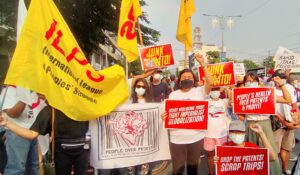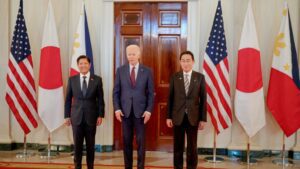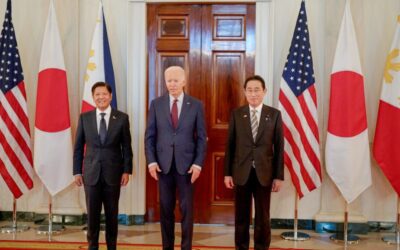By Neil Jan Efrein Dizon and Jamaica Marciano
AHEAD OF THE 12th World Trade Organization (WTO) Ministerial Conference, which has been indefinitely postponed due to the COVID-19 threat, local and international organizations called to junk the very global organization that deals with the rule of trade between nations.
The Ministerial Conference is the topmost decision-making body of the WTO that usually meets every two years. Convening all WTO members, the Conference has the power to take decisions on all matters under any of the multilateral trade agreements.
Representatives of various organizations assembled through the webinar, ‘A future without WTO: People’s health and livelihood over profit’ in November, demanding to dismantle the WTO in favor of a more “pro-people trade regime”. According to the organizers, the regime “imagines a new just and peaceful system without competition”.
Since the WTO’s inception in 1995, livelihood of farmers and fisherfolk worldwide has been damaged or destroyed, according to people’s organizations that organized and joined the webinar like People Over Profit, International League of People’s Struggles (ILPS), People’s Coalition for Food Sovereignty (PCFS), International Indigenous Peoples Movement for Self-Determination and Liberation (IPMSDL), Asia Pacific Research Network (APRN) and IBON International.
“It is now critical for us to get rid of the future. It is critical for us to dismantle the WTO,” Azra Sayeed, Executive Director of Roots for Equity, said in her opening remarks.
Losers from trade
Social activist Antonio Tujan Jr. explained that the WTO was formed since UN-affiliated governments recognized the role of international trade in answering the need for economic revival after World War II. With its establishment came intensified neoliberal policies in trade, investment, and finance, which only favored transnational corporations in terms of better patent protection, trade rules, tax exemption, and environmental rules.
Representatives of people’s organizations during the webinar summarized the WTO’s short and long-term consequences on different sectors, including women, indigenous peoples, and the environment.
Gertrude Kenyangi of Support for Women in Agriculture and Environment said that the policies of the WTO are deeply felt among the ranks of women, adding that the organization is a “tool used by corporations in exacerbating gender injustice and the impoverishment of rural women.”
The WTO worsens not only the power imbalance between men and women, but also between regions, according to Kenyangi. Rural women are dependent on small livestock to sustain their families, but they have almost zero to limited access to production resources, she said. “Gender injustice is embedded in the traditional patriarchal system as it fuels the neoliberal system of corporations that puts profit over people,” Kenyagi concluded.
Jiten Yumnam of the Centre for Research and Advocacy Manipur further noted in a video testimony the regional impacts of the WTO’s free trade agreements.
“The World Trade Organization has a neoliberal agenda that promotes neoliberal globalization, privatization, and deregulation of policies that affected indigenous people all over Asia and many parts of the world, in Manipur and the northeast part of India,” Yumnam said.
He added that due to the WTO, India pursues a neoliberal economy by increasing investments and corporatization of land and resources. Multinational companies, he said, are involved in “destroying their natural resources, targeting the rivers, and increasing mining activities and oil exploration, causing indigenous groups to be displaced.” By extension, this threatens their culture, identity, and survival.
Locally, Fernando Hicap, chairperson of fishers group Pamalakaya, discussed the Illegal, Unregulated, and Unreported Fishing (IUUF) Law. The said law, according to the fisherfolk leader, victimizes small fishing communities by undermining their entire livelihood, food security, and fishing rights.
The IUUF Law, he said, denies that the crisis in fisheries was perpetrated by the industrial fishing sector of imperialist economies racing for massive profits as part of global trade.
The Pamalakaya chair highlighted the demands of Filipino fisherfolk: uphold sustainable fisheries, consolidate the fishery distribution sector, hold imperialist countries accountable for crisis in fisheries, respect the fishing rights of small-scale and artisanal fisherfolk, and revoke the WTO Agriculture Agreement.
Prolonging the pandemic
The persisting COVID-19 pandemic has also been partially attributed to the WTO’s policies, with its proposal for current and post-pandemic trade recovery labeled as “profit-driven” and “corporate-centric.” It has been accused of locking the people’s greater need for health care behind a paywall due to privatization.
Dr. Edelina Dela Paz of the Health Alliance for Democracy expressed the urgent need to prioritize the people’s health over the businesses’ right to profit, especially when there is still an ongoing pandemic.
Dela Paz explained that long-term solutions concerning the country’s public health emergencies should be prioritized. Public health systems need to be developed and geared toward providing free, quality, and comprehensive services funded by taxpayers.

Activists hold protest during the International Day of Action against the WTO. (Photo from ILPS)
Peter Murphy of WORKINS further explained that the failure of the WTO in the production and distribution of COVID-19 vaccines as a global public good contributed to the deaths of 2 million people worldwide.
The campaign continues
The 12th WTO Ministerial Conference may be postponed for now, but the call to junk the WTO continues, said the organizers.
As a closing remark to the webinar, Helda Khasmy of ILPS Indonesia emphasized that the impact of the imperialist free trade regime through the WTO is real to the destruction of nature and social life.
“We are actually free and can move forward to solve problems of nature and society without imperialism and the WTO. We can move freely, create a completely new system that is more just and peaceful without competition between nation and people. The WTO must be ended,” Khasmy said.
On November 30, the International Day of Action against the WTO was held via onground and online protests to further amplify the calls to dismantle the WTO.

![By Neil Jan Efrein Dizon and Jamaica Marciano AHEAD OF THE 12th World Trade Organization (WTO) Ministerial Conference, which has been indefinitely postponed due to the COVID-19 threat, local and international organizations called to junk the very global organization that deals with the rule of trade between nations. The Ministerial Conference is the topmost decision-making […]](https://www.altermidya.net/wp-content/uploads/2021/12/WTO-image-1-e1639004355584.jpg)








0 Comments